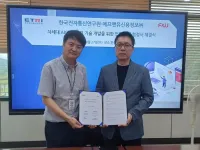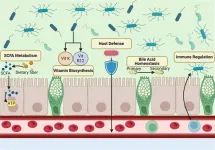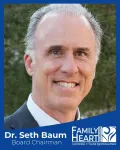(Press-News.org) EMBARGOED: NOT FOR RELEASE UNTIL FRIDAY 15 NOVEMBER 2024 AT 11:00 ET (15:00 UK TIME).
Researchers are calling for a ‘resilience index’ to be used as an indicator of policy success instead of the current focus on GDP.
They say that GDP ignores the wider implications of development and provides no information on our ability to live within our planet’s ‘safe operating space’.
In a paper published today [15 November] in the journal One Earth, researchers from the University of Southampton, UCL and the University of East Anglia outline the case for using a resilience index to inform policy decisions, arguing it would be a much more appropriate measure for the modern age than GDP.
“Resilience is about the ability of a system to prepare for, resist, recover and adapt to disturbances in order to function successfully,” says Professor Ian Townend, lead author of the paper from the University of Southampton.
“This invites us to take a more holistic view, accommodating both human and natural components of complex systems that extend across environmental, social and economic domains.”
Gross Domestic Product (GDP) was adopted to guide progress when the Great Depression of the 1930’s led to a need for economic growth. Since then, it has become one of the most significant policy indicators.
But there is increasing concern about our use of resources on a finite planet and the growing and interacting pressures of pollution, biodiversity loss and climate change.
That’s prompted scientists to consider a ‘safe operating space’ that ensures humanity has an adequate social foundation, while remaining within sustainable ecological limits (also known as planetary boundaries).
“As we encroach on planetary boundaries, the number of organisms an ecosystem can support is reduced,” says Prof Townend. “Similarly, if we don’t address inequality, embark on conflict, or suffer major disasters, our social foundations are diminished.”
The researchers believe that a resilience index can help policy makers to steer a course through this safe operating space.
Professor Jon French, a coauthor on the paper from UCL, says: “Often what we can measure is what gets done, so it’s important to provide a quantitative measure of resilience at local, national and global scales.
“Necessarily, such a measure will incorporate value judgements. Rather than seeing this as a drawback, this can allow differing views within a society to be captured.
“It also helps decision makers to consider the inherent trade-offs when dealing with systems that extend across social, environment and economic domains.”
In the paper, the researchers provide two examples of how a resilience index might be used at a national and global scale.
The University of Southampton has developed a model to index the resilience of England’s coastal communities. The model allows decision makers to adjust the relative weight given to different priorities, such as human health, economic damage or habitat loss.
This means stakeholders, such as local government, businesses, or communities, can influence how resilience is quantified based on their specific needs, ensuring decisions reflect a balanced view of competing interests.
The team applied a similar method on a global scale using existing data sets. They mapped biophysical and social performance measures to index the resilience of 132 countries during 1992 and 2015.
In this illustrative example, the global index revealed a trend towards progress being made on social measures at the expense of biophysical measures of resilience.
The team believe such models could enhance or even replace traditional performance measures, but suggest further development is needed.
“We urgently need to think about how we mobilise a global change in outlook,” says Professor Robert Nicholls, another coauthor on the paper from the Tyndall Centre for Climate Change Research at the University of East Anglia.
“That means moving away from the focus on GDP to measures that track the challenges we face to meet societal needs and recognise that these are inextricably linked to the needs of all life on earth.”
The paper Framing resilience to manage complex environmental systems is published in One Earth and is available online.
The work was supported by the UK Climate Resilience Programme through UK Research and Innovation (UKRI).
Ends
Contact
Steve Williams, Media Manager, University of Southampton, press@soton.ac.uk or 023 8059 3212.
Notes for editors
The paper Framing resilience to manage complex environmental systems will be published in One Earth. An advanced copy of the paper is available upon request
For Interviews with Prof Ian Townsend please contact Steve Williams, Media Manager, University of Southampton press@soton.ac.uk or 023 8059 3212.
Images available via link: https://safesend.soton.ac.uk/pickup?claimID=2j83KXRQVXzDADhD&claimPasscode=7HUHXnYFjrYW2pV7
Coastal Communities: Shows the Resilience Index applied to England’s coastal communities using different weightings to prioritise social, economic, or environmental considerations, as well as a combined index.
Global index: Shows national populations (size of circle denotes the size of the population) plotted on a social (Y) and biophysical (X) weighted resilience axis. Orange circles are based on data from 1992, while blue circles are based on data from 2015. The black line indicates the track of the index starting in 1992 (open black circle) to 2015 (filled black circle). Green arrows indicate the direction needed to improve global resilience.
Additional information
The University of Southampton drives original thinking, turns knowledge into action and impact, and creates solutions to the world’s challenges. We are among the top 100 institutions globally (QS World University Rankings 2025). Our academics are leaders in their fields, forging links with high-profile international businesses and organisations, and inspiring a 22,000-strong community of exceptional students, from over 135 countries worldwide. Through our high-quality education, the University helps students on a journey of discovery to realise their potential and join our global network of over 200,000 alumni. www.southampton.ac.uk
www.southampton.ac.uk/news/contact-press-team.page
Follow us on X: https://twitter.com/UoSMedia
END
Resilience index needed to keep us within planet’s ‘safe operating space’
We need to shift focus from GDP towards more holistic measures, say researchers
2024-11-15
ELSE PRESS RELEASES FROM THIS DATE:
How stress is fundamentally changing our memories
2024-11-15
Researchers at The Hospital for Sick Children (SickKids) have uncovered that stress changes how our brain encodes and retrieves aversive memories, and discovered a promising new way to restore appropriate memory specificity in people with post-traumatic stress disorder (PTSD).
If you stumble during a presentation, you might feel stressed the next time you have to present because your brain associates your next presentation with that one poor and aversive experience. This type of stress is tied to one memory. But stress from traumatic events ...
Time in nature benefits children with mental health difficulties: study
2024-11-15
A team of researchers from McGill and Université de Montréal’s Observatoire pour l’éducation et la santé des enfants (OPES, or observatory on children’s health and eduation), led by Sylvana Côté, found that spending two hours a week of class time in a natural environment can reduce emotional distress among 10- to 12-year-olds who had the most significant mental health problems before the program began.
The research comes on the heels of the publication of a UNICEF ...
In vitro model enables study of age-specific responses to COVID mRNA vaccines
2024-11-15
mRNA vaccines saved lives during the COVID-19 pandemic, but older people had less of an immune response to the vaccines than did younger adults. Why? Boston Children’s researchers, led by Byron Brook, PhD, and Ofer Levy, MD, PhD, have found some answers, while providing proof-of-concept of a new system that can model vaccine responses in a dish.
The test system, described in a paper out today in iScience, is called MEMPHIS (Modular Evaluation of immunogenicity using Multi-Platform Human In vitro Systems). It analyzes whole human blood from people of different age groups and applies both proteomics and targeted assays to measure ...
Sitting too long can harm heart health, even for active people
2024-11-15
More time spent sitting, reclining or lying down during the day may increase the risk of cardiovascular disease (CVD) and death, according to a study in JACC, the flagship journal of the American College of Cardiology, and presented at the American Heart Association’s Scientific Sessions 2024. More than roughly 10-and-a-half hours of sedentary behavior per day was significantly linked with future heart failure (HF) and cardiovascular (CV) death, even among people meeting recommended levels of exercise.
“Our findings support cutting back on sedentary time to reduce cardiovascular risk, with 10.6 hours a day marking a potentially key threshold ...
International cancer organizations present collaborative work during oncology event in China
2024-11-15
XI’AN, CHINA [November 15, 2024] — The National Comprehensive Cancer Network® (NCCN®)—an alliance of leading cancer centers in the United States—is taking part in the Fourth International Congress of the Asian Oncology Society and the Chinese Congress on Holistic Integrative Oncology (2024 CCHIO) sponsored by the China Anti-Cancer Association (CACA), Chinese Institute of Development Strategy on Holistic Integrative Medicine, and Asian Oncology Society (AOS). The three-day event highlights international collaborations to improve cancer treatment and outcomes across China and beyond.
“NCCN ...
One or many? Exploring the population groups of the largest animal on Earth
2024-11-15
FROM: James Urton
University of Washington
206-543-2580
jurton@uw.edu
(Note: researcher contact information at the end)
Hunted nearly to extinction during 20th century whaling, the Antarctic blue whale, the world’s largest animal, went from a population size of roughly 200,000 to little more than 300. The most recent estimate in 2004 put Antarctic blue whales at less than 1% of their pre-whaling levels.
But is this population recovering? Is there just one population of Antarctic blue whales, or multiple? Do these questions matter for conservation?
A team led by Zoe Rand, a University of Washington doctoral student, tackles these questions ...
ETRI-F&U Credit Information Co., Ltd., opens a new path for AI-based professional consultation
2024-11-15
A group of South Korean researchers has decided to utilize AI technology to support customer counseling services. Through this, it will provide a significant boost to the performance and efficiency of counselors in various industries, while improving the overall quality of customer counseling services, ultimately making it easier to meet the customers’ needs and expectations while opening up the possibility for realizing new values.
Electronics and Telecommunications Research Institute (ETRI) announced that ...
New evidence links gut microbiome to chronic disease outcomes
2024-11-15
The gut microbiome, an ecosystem of trillions of microorganisms in the human digestive tract, has been increasingly linked to chronic diseases. Research led by Dr. Connor Prosty and his team at McGill University consolidates recent findings that demonstrate a causal role for the gut microbiome in the progression of multiple diseases, ranging from gastrointestinal conditions to immune-related and psychiatric disorders. Published in eGastroenterology, this narrative review examines how manipulating the gut microbiome ...
Family Heart Foundation appoints Dr. Seth Baum as Chairman of the Board of Directors
2024-11-15
Family Heart Foundation Appoints Dr. Seth Baum as Chairman of the Board of Directors
Dr. Seth Baum, Florida Atlantic University, Named Chairman of the Family Heart Foundation’s Board of Directors
The Family Heart Foundation® is proud to announce the appointment of Dr. Seth Baum as the Board of Directors Chairman. An esteemed expert in preventive cardiology and lipidology, Dr. Baum has insights and extensive experience that will contribute to the Foundation’s strategic mission to increase awareness for lay public, expand screening for high-risk populations, improve understanding and education for healthcare teams, and promote ...
New route to ‘quantum spin liquid’ materials discovered for first time
2024-11-15
A new route to materials with complex ‘disordered’ magnetic properties at the quantum level has been produced by scientists for the first time.
The material, based on a framework of ruthenium, fulfils the requirements of the ‘Kitaev quantum spin liquid state’ - an elusive phenomenon that scientists have been trying to understand for decades.
Published in Nature Communications the study, by scientists at the University of Birmingham, offers an important step towards achieving and controlling quantum materials with sought-after new properties that do not follow ...
LAST 30 PRESS RELEASES:
Modern twist on wildfire management methods found also to have a bonus feature that protects water supplies
AI enables defect-aware prediction of metal 3D-printed part quality
Miniscule fossil discovery reveals fresh clues into the evolution of the earliest-known relative of all primates
World Water Day 2026: Applied Microbiology International to hold Gender Equality and Water webinar
The unprecedented transformation in energy: The Third Energy Revolution toward carbon neutrality
Building on the far side: AI analysis suggests sturdier foundation for future lunar bases
Far-field superresolution imaging via k-space superoscillation
10 Years, 70% shift: Wastewater upgrades quietly transform river microbiomes
Why does chronic back pain make everyday sounds feel harsher? Brain imaging study points to a treatable cause
Video messaging effectiveness depends on quality of streaming experience, research shows
Introducing the “bloom” cycle, or why plants are not stupid
The Lancet Oncology: Breast cancer remains the most common cancer among women worldwide, with annual cases expected to reach over 3.5 million by 2050
Improve education and transitional support for autistic people to prevent death by suicide, say experts
GLP-1 drugs like Ozempic could cut risk of major heart complications after heart attack, study finds
Study finds Earth may have twice as many vertebrate species as previously thought
NYU Langone orthopedic surgeons present latest clinical findings and research at AAOS 2026
New journal highlights how artificial intelligence can help solve global environmental crises
Study identifies three diverging global AI pathways shaping the future of technology and governance
Machine learning advances non targeted detection of environmental pollutants
ACP advises all adults 75 or older get a protein subunit RSV vaccine
New study finds earliest evidence of big land predators hunting plant-eaters
Newer groundwater associated with higher risk of Parkinson’s disease
New study identifies growth hormone receptor as possible target to improve lung cancer treatment
Routine helps children adjust to school, but harsh parenting may undo benefits
IEEE honors Pitt’s Fang Peng with medal in power engineering
SwRI and the NPSS Consortium release new version of NPSS® software with improved functionality
Study identifies molecular cause of taste loss after COVID
Accounting for soil saturation enhances atmospheric river flood warnings
The research that got sick veterans treatment
Study finds that on-demand wage access boosts savings and financial engagement for low-wage workers
[Press-News.org] Resilience index needed to keep us within planet’s ‘safe operating space’We need to shift focus from GDP towards more holistic measures, say researchers


